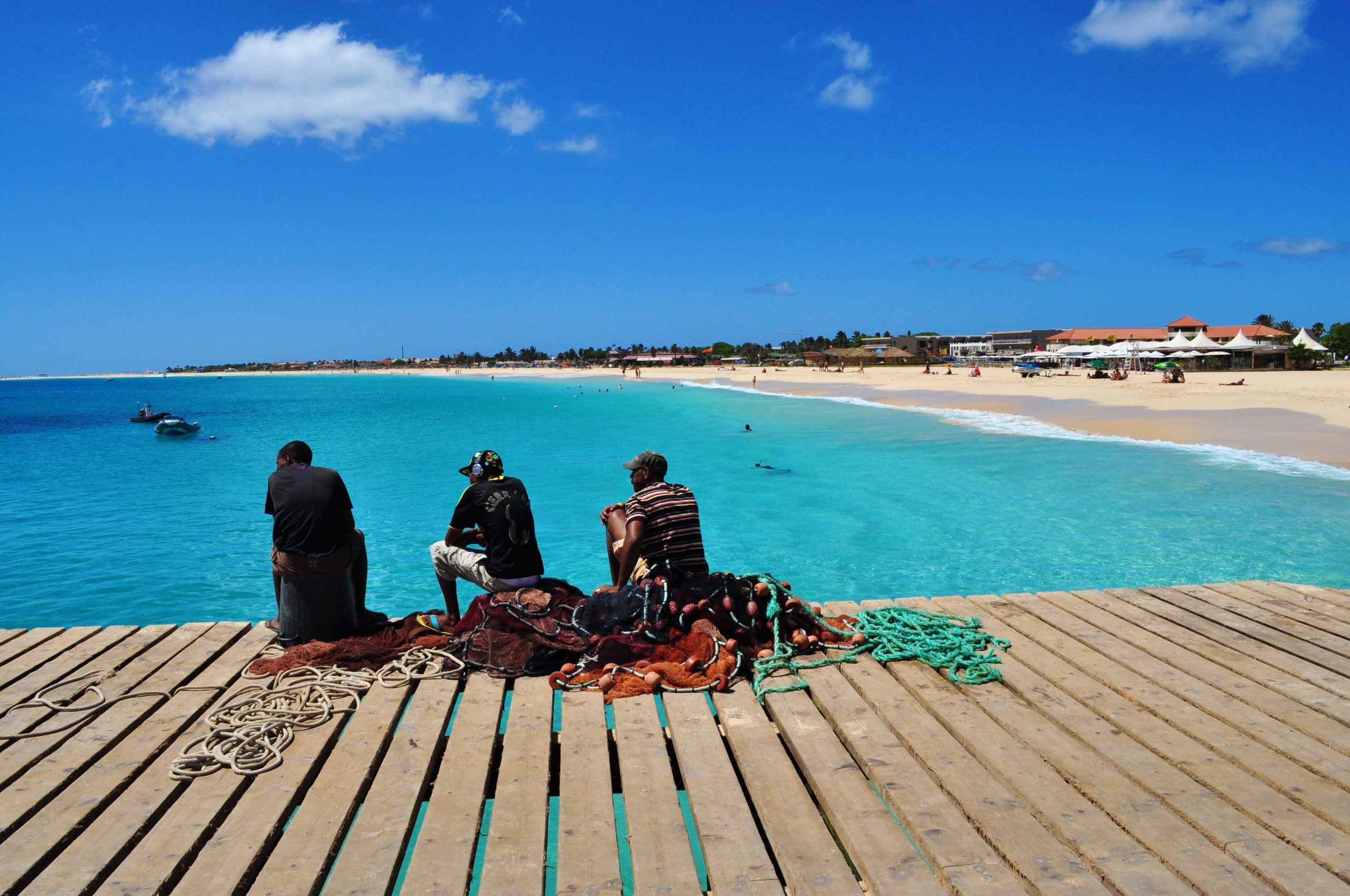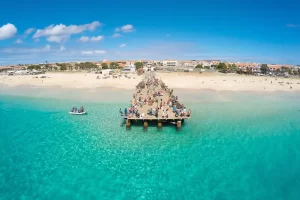Get Ready to Chat Like a Local on Sal Island!
- Hello and Greetings – Let’s Get Started!
- Hello
Portuguese: Olá
Creole: Bó (pronounced “boh”)
Start your day with a friendly “Olá!” and you’ll fit right in. In Creole, locals will often say “Bó” as a casual greeting. Either works, depending on how local you’re feeling!
- Good morning
Portuguese: Bom dia
Creole: Bom dia (pronounced the same!)
Locals will be out early enjoying the sun, so if you’re up for a sunrise walk on the beach, “Bom dia!” is the perfect way to say, “Good morning.”
- How Are You?
Portuguese: Como está?
Creole: Kumé ta bai? (pronounced: “koo-meh tah by?”)
A classic! Whether you’re chatting with a café owner or a friendly local in Santa Maria, asking “Kumé ta bai?” will always earn you a smile.
- Thanks and Politeness – Show the Love
- Thank You
Portuguese: Obrigado (for men) / Obrigada (for women)
Creole: Merces (pronounced: “mehr-sess”)
Saying “Obrigado” or “Obrigada” is polite, and it’s great to use when someone hands you your coffee or gives you directions. Creole speakers say “Merces,” and you’ll be a hit with the locals for knowing this one!
- Please
Portuguese: Por favor
Creole: Por favor (pronounced: “pohr fah-vohr”)
“Por favor” works in both languages, so you’re covered no matter what. Whether you’re asking for the check or requesting a table by the beach, remember to throw in a “Por favor” to keep it polite.
- You’re Welcome
Portuguese: De nada
Creole: Nada (pronounced: “nah-dah”)
When someone thanks you, just hit them with a quick “De nada” or “Nada” in Creole. You’ll sound like a local in no time!
- Getting Around – Your Travel Essentials
- Where Is…?
Portuguese: Onde fica…?
Creole: Ké lugar é…?
If you’re searching for a restaurant, the beach, or a bus stop, use this phrase to ask for directions. Locals will be more than happy to help you find your way!
- How Much Is This?
Portuguese: Quanto custa?
Creole: Kantu ki ta custa? (pronounced: “kahntoo kee tah koosta?”)
You’ll need this one when shopping in the markets or grabbing souvenirs. “Kantu ki ta custa?” is the Creole version, and it’s always good to know how to ask for prices.
- I’m Lost
Portuguese: Estou perdido (for men) / Estou perdida (for women)
Creole: Sta perdu (pronounced: “stah per-doo”)
It happens! If you ever get turned around while exploring the island’s streets or beaches, a simple “Estou perdido/perdida” will let someone know you need help finding your way.
- Eating Out – Time for Some Delicious Food!
- I’m Hungry
Portuguese: Estou com fome
Creole: Ta tene fome (pronounced: “tah teh-neh foh-meh”)
There’s nothing like the hunger you feel after a long day of beach time! Use “Estou com fome” to express that you’re ready for some Cachupa or fresh seafood.
- Delicious!
Portuguese: Delicioso
Creole: Muitu bom (pronounced: “mwee-too bom”)
If you love the food on Sal (which, let’s be honest, you will), don’t forget to compliment the chef with a hearty “Delicioso!” in Portuguese or “Muitu bom!” in Creole.
- Water
Portuguese: Água
Creole: Água (pronounced the same!)
Simple, but crucial. If you’re sipping on a cold bottle of water after sunbathing, “Água” will get you what you need.
- Fun Phrases – Keep It Light!
- What’s Your Name?
Portuguese: Qual é o seu nome?
Creole: Ké nomi? (pronounced: “keh noh-mee?”)
Strike up a conversation with a friendly local and learn their name. Everyone loves meeting travelers, and “Ké nomi?” is a great icebreaker.
- Where Are You From?
Portuguese: De onde você é?
Creole: D’onde bo é? (pronounced: “dohnd boh eh?”)
This is a fun way to find out where other visitors or locals are from. Maybe you’ll meet someone from your hometown!
- Goodbye
Portuguese: Adeus
Creole: Tchô (pronounced: “choh”)
Time to head out? Whether you’re leaving a restaurant or saying goodbye to a new friend, “Tchô” in Creole is the way to go.
- Emergency Phrases – Better Safe Than Sorry!
- Help!
Portuguese: Socorro!
Creole: Soku (pronounced: “soh-koo”)
Hopefully, you won’t need this one, but it’s good to know just in case. If you find yourself in an emergency, shouting “Socorro!” will definitely grab attention.
- I Need a Doctor
Portuguese: Preciso de um médico
Creole: Ta pede doutor (pronounced: “tah peh-deh doo-tohr”)
In case of illness or injury, you’ll want to know how to ask for medical help. Both versions will get you to the doctor in no time.
Now that you’ve got a handful of handy phrases to help you navigate Sal, you’re ready to explore the island like a pro!
So, pack your bags, book that flight, and get ready to enjoy Sal’s stunning beaches, lively culture, and warm-hearted people. Who knows? You might even become fluent in Creole by the end of your stay!




